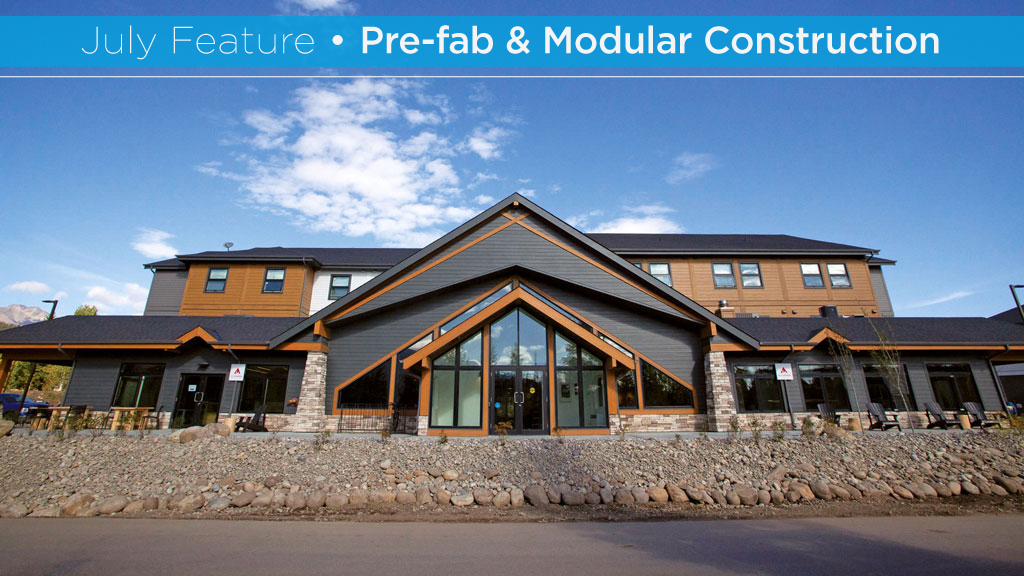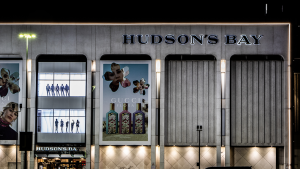The demand for affordable accommodations in Jasper National Park, located on the eastern slope of the Rocky Mountains, is sky-high, so to speak.
A little over two million visitors come to Jasper every year in both summer and winter.
When Hostelling International (HI) Canada decided to increase the size of its Jasper hostel it opted to go modular.
To do so, it hired NRB Modular Solutions Inc., which built and installed 66 modules in a three-storey lodge 25,000-square-feet in area.
The modular rooms have several different configurations: 25 four-bed shared rooms, 17 private rooms and five family rooms.
Amenities include guest laundry, an onsite café, kitchen, patio with barbecue and a fire pit.
In addition, NRB built two staff accommodation buildings and a maintenance facility.
Shelbey Sy, director of marketing for HI Canada, says the organization chose modular over traditional construction for two reasons.
“Two key factors led to our decision to opt for modules over conventional construction,” says Sy. “Due to Jasper’s short construction season, it was much more practical to have the bulk of the building construction take place off-site (at NRB’s Kelowna, B.C. facility).
“By building in a climate-controlled interior environment, we were able to construct the hostel in a shorter period of time and under a more predictable cost and building timeline. This allowed us to plan the project and the date of its opening with greater confidence.”
Sy says HI Canada supports sustainability in its operations.
“The lower environmental impact of modular construction – because it requires fewer deliveries into the park, produces less waste and takes less time to construct – was also a key factor in our decision,” she says. “When combined with the uncertainties around Jasper’s weather conditions, modules over traditional construction was a clear choice for us.”
Sy says the new HI Jasper hostel “could not be more different” from the older facility.
“The former hostel was originally built as a day lodge for the Whistler Ski area before HI Canada transformed it to a hostel in 1979,” Sy says. “Reflecting the times, it was a wood-framed chalet, with large rooms and limited washroom facilities.
“The new hostel has nearly doubled our previous capacity and dramatically improves the hostel experience with space for 157 guests a night in private rooms and four-person shared rooms. It also has an onsite café as well as spacious and modern common areas.”
Sy says HI Jasper is the organization’s first experience with modular construction.
In addition to the Jasper hostel, NRB has built “a few” modular hotels, including a Hyatt Place in Prince George, says Craig Mitchell, a modular and off-site construction consultant with Blackbox Offsite Solutions in Vancouver.
“Before COVID, Marriott, Hilton and IHG (IHG Hotels and Resorts, which owns Holiday Inn) all had modular programs in the works,” says Mitchell.
“COVID caused the hospitality industry some pain and they are just restarting their build programs again and dusting off their modular prototypes.
citizenM (boutique hotels) is using steel modules from Europe and China.”
Mitchell says there are many examples of modular construction in the U.S. hospital industry.
“There are fewer in Canada, however, because the market here is smaller and less mature,” he says. “There are definitely good opportunities for the Canadian hospitality industry, because the uniformity in design works well with certain brands of hotels.”
Mitchell says two benefits of modular construction to the hospitality industry are low cost and speed of construction and installation.
“In addition, modular means quality and consistency across all brands, no matter where the hotel is located,” he says. “For major brands this is important, because many hospitality guests want to know what to expect when they visit. For example, a Fairfield Inn (franchised economy to mid-scale hotel brand of Marriott International) in Kamloops or Winnipeg or somewhere else. It’s the Starbucks or McDonald’s approach.”
Mitchell says modular hospitality industry properties are typically built with a podium or slab as the first floor, because of the requirement for high ceilings, with modular rooms installed above the podium.
“When done well, modular rooms are quiet, because of the built-up assemblies of the structure,” he says.
Mitchell says modular construction has a rosy future in the Canadian hospitality industry.
“But first we need more factories building better examples of modular hotel and hostel rooms and showing success,” he says. “There haven’t been enough success stories yet.”







Recent Comments
comments for this post are closed